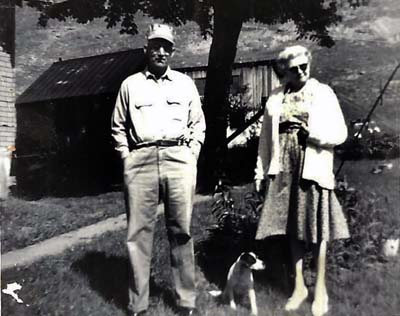Rocky Cornfields, a Watch, Confederate Money, and a Couple Millstones
By James C. Clark

Our authorís grandparents, John E. and Merle Marple, pose with their terrier at their Hackers Creek home in 1964. All photos courtesy of our author.
Last year, I was privileged to attend the 60th class reunion of Buckhannon-Upshur High School. I realized that all of those people, including yours truly, have gotten pretty old. Clearly, we all have a lot more yesterdays in us than tomorrows, so I’d like to spend a little time remembering.
I was born in August 1938 on Hackers Creek in Upshur County in the home of my grandparents, John E. and Merle Marple. About 1947 or 1948, their son Charles enlisted in the Army. Grandpa was milking about 12 or 14 cows at the time and had no help. So I went to live with them for a while. I’d get up around 4 a.m. and herd the cows into the barn.
Grandpa didn’t have a tractor, so he did all the work with Prince and Fred, his team of horses. One day, we were using the horses and a kick rake to stack hay into windrows. We went through a bumblebee nest, the horses took off, and I fell off the back of the rake. The bees got all over me and stung me 30 or so times on my head and face. Grandpa had a hired hand who chewed and rubbed snuff. I think he did both at the same time as it was always running down the corners of his mouth. To say the least, he wasn’t the cleanest man around. He told us to put some of his tobacco on the stings to make them feel better. My dad looked at the guy and said, “No, the boy will live.” Dad wasn’t having any of that.
There were a lot of jobs on the farm they don’t have now. I disliked one task more than any other. After working the ground and planting the corn, you had to cultivate the hard, rocky soil. We used a horse to pull the cultivator. If the cornfield was on a hillside, the job was a bigger challenge because you had to walk in the row below the one you were cultivating. And then came the hoeing. You had to make sure you got all the weeds and not cut any of the corn. You talk about a hot and tiring job. But you’d always have a jug of water at each end of the field, and we couldn’t wait to get there.
When I look at cornfields today, I can’t help but wonder how much more corn we would have had back then. We thought you had to plant the hills of corn three feet apart and three grains to the hill. Now they’re crammed so tightly you can barely see between them. On the other hand, if we’d planted more, we would’ve had a lot more corn to shuck and a lot more fodder to shock. So I guess it was good we didn’t know any better.
Then there was filth to be cut. We used the team of horses and a cutting machine for some of it, but mostly, we did it by hand with a scythe. That wasn’t easy because scythes were heavy to swing, or even carry. About this time, they came out with aluminum handles and an aluminum shovel, which made it easier to clean the barn. Most of the farms back then looked a whole lot better than they do today, not nearly as grownup.
In 1948, Grandpa bought a Ford tractor, which came with a mowing machine, plow, disk, and buck rake. We felt like really big-time farmers. One day, Grandpa and Grandma went to an annual dairy dinner and meeting. I thought to myself, “What a great time to learn to run the tractor!” They had it parked in the old shed with the keys in it. It took me a little while to get it in reverse. Then I drove it out of the shed and headed for the barn, which was about 300 yards away. When I got there, I stood on one brake, slid the tractor around 180 degrees, and went back to the shed, thinking no one would ever know. The next morning, I got up and went after the cows. When we got back to the barn, Grandpa asked, “Did you get the tractor back in alright?” I’d forgotten about all the tracks I’d left behind in the mud. But it was alright for me to drive the tractor after that.
One winter, Grandpa was up the hollow feeding the cows when he lost a cherished pocket watch that had belonged to his late brother Arlie. As luck would have it, the watch turned up the next spring when Grandpa was plowing up the bottomland. He wound it up and gave it to me.
You can read the rest of this article in this issue of Goldenseal, available in bookstores, libraries or direct from Goldenseal.